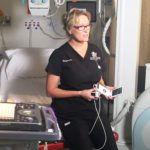
The Utility of Ultrasound for distinguishing heart failure from other causes of dyspnoea in older persons.
Elderly people often present to the emergency department short of breath. The two most common causes – heart failure and chronic lung disease- appear much the same but need very different treatments. Differentiating the two relies on taking a good history, performing an examination and doing basic investigations such as blood tests, electrocardiogram and chest x-ray (CXR). The most accurate diagnosis from the early tests is when the CXR shows a pattern called ‘alveolar interstitial syndrome’ (AIS). An experienced doctor then adds this piece of information to other parts of the history and clinical findings, to decide if the AIS…
Principal Investigator:
Dr Kylie Baker
Amount Awarded: $46,000.00
Institution: Ipswich Hospital
READ MORE
READ MORE

Accelerated pathway in the assessment of suspected acute coronary syndrome in the Emergency Department: a diagnostic accuracy study.
Chest pain is one of the most common conditions treated in the Emergency Department (ED), but making a diagnosis remains challenging and resource-intensive. Not all causes of chest pain are due to heart disease. Currently, doctors do a blood test to look for the presence of a cardiac chemical called Troponin I to assist them in making a diagnosis of heart disease. This chemical is released from heart muscles when they are damaged and is, therefore, a good indicator of heart attack. However, because Troponin I is released slowly, doctors have to wait for up to six hours to determine…
Principal Investigator:
Prof Louise Cullen
Amount Awarded: $200,000.00
Institution: Royal Brisbane & Women's Hospital
READ MORE
READ MORE

Ketamine IntraNasally Delivered in the Emergency Room: KINDER
Sick and injured children in the Emergency Department (ED) often require procedures which can cause severe pain (like fracture reduction, stitching wounds, abscess drainage) or otherwise require the child to be still and cooperative (CT scans, lumbar punctures, removal of foreign bodies). Sedative drugs are given to these patients both to relieve pain/distress and to keep them still for the procedure. ED sedation of children now has a well established body of evidence. Most of the literature relates to when the drug is given intravenously or intramuscularly. Drug delivery by these routes leads to reliable effects as the drug bypasses…
Principal Investigator:
Dr Luke Burman
Amount Awarded: $63,015
Institution: The Townsville Hospital
READ MORE
READ MORE

High Flow Nasal Cannula Treatment for Infants and Children with Acute Respiratory Failure – a Pilot Trial
Worldwide, the respiratory distress associated with pneumonia and other causes remains the leading cause of death in children. In Australia 39% of intensive care admissions for children are due to respiratory disease, with bronchiolitis/viral infection representing 17%, asthma 7% and pneumonia 7%. There is an emerging trend to support respiration with methods other than oxygen, particularly in the early stage of disease process aiming to prevent the progression of disease. In under resourced countries children presenting to hospitals with severe pneumonia have a mortality rate between 13-20% and most deaths occur with hypoxemia before therapeutic benefit of antimicrobials. High flow…
Principal Investigator:
Dr Fiona Thomson
Amount Awarded: $70,000
Institution: Queensland Children's Hospital
READ MORE
READ MORE

REstricted Fluid REsuscitation in Sepsis-related Hypotension (REFRESH)
The REFRESH study is a multicentre, open-label, randomised, phase II clinical feasibility trial. This is the first randomised trial examining fluid volume for initial resuscitation in septic shock in an industrialised country. A pragmatic, open-label design will establish the feasibility of undertaking a large, international, multicentre trial with sufficient power to assess clinical outcomes. The embedded biomarker study aims to provide mechanistic plausibility for a larger trial by defining the effects of fluid volume on markers of systemic inflammation and the vascular endothelium. Participants will be patients presenting to the emergency departments of Australian metropolitan hospitals with suspected sepsis and…
Principal Investigator:
Prof Gerben Keijzers
Amount Awarded: $54,125
Institution: Gold Coast Hospital and Health Service
READ MORE
READ MORE





